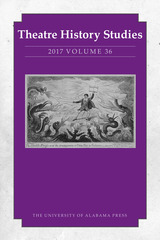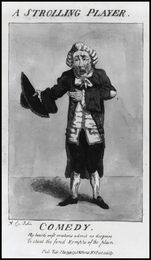
Theatre History Studies is devoted to research in all areas of theatre studies, with special interest in archival research, historical documentation, and historiography. Many issues feature a special section curated around a special theme or topic; for 2017 that special section focus on histories of new writing for the theatre.
Featured in THEATRE HISTORY STUDIES 2017, VOLUME 36
- “Resisting Arlecchino’s Mask: The Case of Marcello Moretti” by Gabrielle Houle
- “Making Space for Performance: Theatrical-Architectural Nationalism in Postindependence Ghana” by David Afriyie Donkor
- “Preparing Boys for War: J. M. Barrie’s Peter Pan Enlists in World War I’s ‘Great Adventure’” by Laura Ferdinand Feldmeyer
- “Not Just Rock ‘n’ Roll: Chicago Theatre, 1984–1990” by Julie Jackson
- “New Writing and Theatre History” by Sara Freeman
- “New Plays in New Tongues: Bilingualism and Immigration at the New Italian Theatre in France” by Matthew McMahan
- “The Waterloo Summer of the Prince of Wales’s Theatre: New Writing, Old Friends, and Early Realism in the Victorian Theatre” by Shannon Epplett
- “Chekhov’s Three Sisters: A Proto-Poststructuralist Experiment” by Sarah Wyman
- “Historicizing Shakesfear and Translating Shakespeare Anew” by Lezlie C. Cross
- “A New Noble Kinsmen: The Play On! Project and Making New Plays Out of Old” by Martine Kei Green-Rogers and Alex N. Vermillion
- “Making New Theatre Together: The First Writers’ Group at the Royal Court Theatre and Its Legacy Within the Young Writers’ Programme” by Nicholas Holden
- “New Writing in a Populist Context: A Play,a Pie, and a Pint” by Deana Nichols
- “American Playwriting and the Now New” by Todd London
- The Robert A. Schanke Award-Winning Essay: “Black Folk’s Theatre to Black Lives Matter: The Black Revolution on Campus” by La Donna L. Forsgren

For centuries scholars, philosophers, and practitioners have attempted to explain just what constitutes comedy, and though no one has come close to a definitive explanation, each attempt highlights some distinct facet of the genre--the genre that Woody Allen has said eats at the children’s table . . . even in the world of scholarship.
The essays gathered in Volume 16 of the annual journal Theatre Symposium illustrate well the range of material that falls under the heading “comedy” as it is played on stage.
Stanley Longman’s essay on “The Commedia dell’Arte as the Quintessence of Comedy” introduces us to the inhabitants of “Commediatown,” character types who are descendents of the Greeks and ancestors, it seems, of almost everyone who came after. Boris Senker, an eyewitness to Croatia’s evolution from communism to democracy, reports on the all-too-real "Commedia" stereotypes that have found their way onto the stage in his homeland.
Other essays address the improvisational nature of "Commedia"; the roots of laughter and the expectations inherent in presenting “old schtick” to a new generation; comedic technique, verbal and physical, in Molière; the use of the macabre to create humor in the "Théâtre du Grand Guignol"; the story of Henry Fielding, the theatre practitioner most responsible for the British government’s crackdown on subversive material, via the Licensing Act of 1737; Beckett’s theatrical connections to the comedy theory of Henri Bergson; and do-it-yourself (DIY) comedy--happenings, situations, gatherings—as practiced in British stand-up comedy.
Theatre Symposium: Volume 16 provides just a glimpse into the possibilities for comedy on the stage. If the past examples allow for extrapolation into the future, the position of comedy as a means of communicating problems and solutions for society’s woes is remarkably sound.
READERS
Browse our collection.
PUBLISHERS
See BiblioVault's publisher services.
STUDENT SERVICES
Files for college accessibility offices.
UChicago Accessibility Resources
home | accessibility | search | about | contact us
BiblioVault ® 2001 - 2024
The University of Chicago Press









